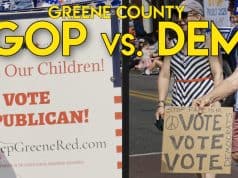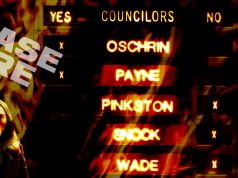
When the American people were deciding whether to ratify the Constitution in 1787–88, they knew that the new federal government would possess greater authority than that granted to Congress under the Articles of Confederation. But they also expected that federal power would remain limited. After all, James Madison, “Father of the Constitution,” assured the people in January 1788 that the “powers delegated by the proposed Constitution to federal government are few and defined. Those which are to remain in the state governments are numerous and indefinite.”
This context is important when considering the true scope of the federal government’s commerce power. For although the Constitution says that Congress may “regulate commerce . . . among the several states,” this power was never meant to provide a broad regulatory authority over anything that impacted interstate commerce in the slightest way. Instead, the commerce power was viewed as a necessary but limited means to preserve free trade in America.
Under the weak Articles of Confederation, fears of dissolution were common, and many Americans recognized that commercial protectionism would likely emerge among the states if the union were to fail. Alexander Hamilton warned that dissention and even war might result if the states did not unite under a new national government having the power to break down barriers to free trade. He wrote in 1787:
The competitions of commerce might be another fruitful source of contention. . . . Each State, or separate confederacy, would pursue a system of commercial policy peculiar to itself. This would occasion distinctions, preferences, and exclusions, which would beget discontent. . . . It is not at all probable that this unbridled spirit would pay much respect to those regulations of trade, by which particular states might endeavor to secure exclusive benefits to their own citizens. The infractions of these regulations on one side, the efforts to prevent and repel them on the other, would naturally lead to outrages, and these to reprisals and wars.
To avoid this outcome in the new government, the framers of the Constitution gave Congress a regulatory power to preserve free trade among the states, for they knew that a free market would provide the best chance for the new nation to prosper in liberty. Hamilton wrote that free trade was “perceived and acknowledged by all enlightened statesmen to be the most useful as well as the most productive source of national wealth.” He believed that the American economy would most benefit by an “unrestrained intercourse between the states.” Thomas Jefferson was confident that the United States “would gain by setting commerce at perfect liberty.” He said that good government “shall leave [the people] otherwise free to regulate their own pursuits of industry and improvement.” And George Washington advised that the nation’s “commercial policy should hold an equal and impartial hand: neither seeking nor granting exclusive favors or preferences; consulting the natural course of things; diffusing and diversifying by gentle means the streams of commerce, but forcing nothing; establishing with powers so disposed; in order to give trade a stable course.”
James Madison was particularly adamant that the commerce power should not be used to create restrictive regulations that “make the government a general supervisor of individual concerns.” He recommended that the federal government “in every doubtful case . . . should forbear to intermeddle [in domestic commerce], and that particular caution should be observed where one part of the community would be favored at the expense of another.” Madison declared that “the industrious pursuits of individuals ought to be left to individuals,” for they were “most capable of choosing and managing them.” He added that “this policy is certainly most congenial with the spirit of a free people.”
For much of our history, the commerce power was rarely employed to restrictively regulate trade. Congress mainly used it as it was designed: to eliminate protectionism among the states. But this all changed in the 1930s.
According to the Office of Management and Budget, “Federal regulation began in earnest in the 1930s with the implementation of wide-ranging New Deal programs.” These programs under President Franklin Roosevelt created more than 100 new federal agencies or offices to administer labor practices, agriculture, banking, housing, mining, insurance, community planning, construction, manufacturing, communication, shipping, securities, and much, much more. Our once-limited federal government quickly became an unrestrained centralized power that began to dominate so many state and individual concerns. Even Roosevelt acknowledged in 1936 that the “economic autocracy” he was building could “provide shackles for the liberties of the people.”
Although Roosevelt’s aggressive New Deal economic agenda sailed through the Democratic-controlled Congress, many parts of it were initially deemed unconstitutional by the Supreme Court. For example, in Carter v. Carter Coal (1936), the Court blocked the federal government from embarking upon a dangerous regulatory course that intruded upon state sovereignty. It knew that the framers of the Constitution, and those who ratified it, never dreamed that the commerce power would include such a broad regulatory authority. The Court wrote:
Every journey to a forbidden end begins with the first step, and the danger of such a step by the federal government in the direction of taking over the powers of the states is that the end of the journey may find the states so despoiled of their powers, or—what may amount to the same thing—so relieved of the responsibilities which possession of the powers necessarily enjoins, as to reduce them to little more than geographical subdivisions of the national domain. It is safe to say that, if, when the Constitution was under consideration, it had been thought that any such danger lurked behind its plain words, it would never have been ratified.
But it did not take long for the Supreme Court to completely reverse its position. In 1937, the Court began to authorize the same kinds of restrictive federal regulations that it had struck down just years before. And soon after, it declared that Congress could regulate practically anything it desired under the Commerce Clause, even local, noncommercial activities. The Court wrote in Wickard v. Filburn (1942) that “even if [an] activity be local, and though it may not be regarded as commerce, it may still, whatever its nature, be reached by Congress.”
Since then, Congress has encroached further upon state powers under the guise of regulating commerce, and the Supreme Court has continued to bestow legitimacy on these actions by sanctioning them in its rulings. Justice Clarence Thomas argued in a dissenting opinion in 2005 that the Court’s endorsement of the federal government’s sweeping commerce power was completely “at odds with the constitutional design.” He believed that the Court’s interpretation of the Commerce Clause was so absurdly expansive and contrary to the framers’ intent that it rendered their guarantees of limited government utterly meaningless. Thomas wrote:
If the [Court] majority is to be taken seriously, the federal government may now regulate quilting bees, clothes drives, and potluck suppers throughout the 50 states. This makes a mockery of [James] Madison’s assurance to the people of New York that the “powers delegated” to the federal government are “few and defined,” while those of the states are “numerous and indefinite.”
The mockery continues, of course, for federal government’s regulatory power has recently grown even more expansive. The 2,700-page Patient Protection and Affordable Care Act of 2010 has spawned over 20,000 pages of implementing regulations, and more are yet to come. (Remember, this is just a tax, according to the Supreme Court.) And the 850-page Dodd-Frank Consumer Protection Act of 2010 is uniquely cumbersome in its own right—Yale Law School Professor Jonathan Macey described the financial regulatory act as follows: “It is an outline directed at bureaucrats, and it instructs them to make still more regulations and to create more bureaucracies.” (For instance, one agency crafted a 500-page proposal just to define a single rule mandated by Dodd-Frank.)
Clearly, this is not what our founders intended when they drafted and ratified the Constitution. The commerce power has been wielded in ways that are contrary to its design, and as a consequence, our nation has progressed along an illegitimate course toward greater federal regulatory control. Without question, the longer we continue down this course, the closer we come to the end of our liberty.









the longer we continue down this course, the closer we come to the end of our liberty.
Central regulation has its downsides, but in what respect does someone who needs health care and can’t afford it, or someone who is receiving health care in an unregulated hospital or physician’s office, have liberty in that situation? Your definition of the term is very narrow. There is no liberty without power, and an imbalance of power creates an imbalance of liberty. Absolute power destroys liberty for the powerless. Government regulation is intended to provide liberty to the otherwise powerless by restraining the abuse of power. You may believe that we over-regulate, and that our current level of regulations hurt the economy. But you could at least acknowledge the argument in principle to be made for regulation.
I might also ask, since you stand for liberty, if you oppose restricting “a woman’s right to choose”? If you believe that the Affordable Care Act is wrong to restrict a physician’s freedom, do you also oppose McDonnell’s restrictions on abortion providers? You don’t need to recite pro-life arguments here. I’m pro-life myself. But it seems that for you too, liberty is not an absolute.
Ken, I would never suggest that government has no role in the economy. Given the purpose of the Commerce Clause to guarantee a free market in the United States, it has a role in policing the abuse of power that may form among participating entities–its antitrust regulation is one of the most important roles to serve in that regard. (Btw, FDR suspended antitrust provisions in many New Deal programs so that big businesses could collude at the direction of big government, bringing about crony capitalism, which, as far as I can tell, seems to have been the source of complaint for so many Occupy groups last fall. I wonder if they know the source of their frustration.)
To your question about those in need, just because the coercive arm of government doesn’t provide, doesn’t mean that the needy will go without care. The American people have proven time and again to be the most charitable people in the world, and I think such giving has a greater impact on the recipient because he/she doesn’t feel entitled to some kind of benefit that government distributes after first taking it by force (there’s nothing morally superior about government handouts). Also, in the absence of regulation for places like hospitals, I think you’d find trade standards form (as you do in many professions already where government doesn’t dictate all rules) to raise quality and care and to assure the public of the qualifications of those providers.
Finally, to your abortion question, McDonnell’s restrictions on abortion providers were written in an effort to navigate the Supreme Court’s arbitrary rules it created in its abortion rulings (legislating from the bench on a topic that is arguably reserved to the states to decide). Rather than imposing these restrictions that are indirectly aimed to reduce abortions, I think he should have taken bolder action that other states are taking (see North Dakota).
A common criticism that progressives like to throw at conservatives is that they are hypocritical on many issues because they are against regulation here, but support regulation there. But what I often see among these progressives is that they lack a fundamental understanding about the nature of our government. Just because the federal government lacks power to act in certain cases, doesn’t mean states have no power to do so. Reread Madison’s statement in my first paragraph above: “The powers delegated by the proposed Constitution to federal government are few and defined. Those which are to remain in the state governments are numerous and indefinite.” We are a diverse people and we can be so in our state and local governments. We don’t need a one-size-fits-all approach on all issues dictated by politicians or judges in the federal government. This is Thomas Jefferson in 1800 (it’s even more applicable today):
Our country is too large to have all its affairs directed by a single government. Public servants at such a distance, and from under the eye of their constituents, must, from the circumstance of distance, be unable to administer and overlook all the details necessary for the good government of the citizens; and the same circumstance, by rendering detection impossible to their constituents, will invite public agents to corruption, plunder and waste.
Thanks for the reply, Brian. That’s a fascinating irony there are about FDR and the Occupy movement, although I’m not sure crony capitalism is any worse than the unchecked, unregulated capitalism of the Gilded Age. It just makes for more cronies. Anyhow, “a role in policing the abuse of power” just begs the question doesn’t it? I understand why conservatives think the federal government oversteps its ideal role, but the Supreme Court hasn’t seen it as unconstitutional, and the Constitution gives the court the power to decide. And while it’s true that the states have power to stop abuses that the federal government doesn’t stop, it’s not true that they always do.
Likewise, I agree that aid is best given and received on the local level. Local aid is most efficient and effective, and it best promotes community and individual responsibility. Agreed. But if the American people, or just the churches alone, were so darn generous, the old and the poor and the sick would never have needed government aid in the first place. The reason for the War on Poverty was poverty. Governmental waste and red tape and all the unintended consequences to the family and to individual initiative, etc. are prices we’ve paid for not loving our neighbors as ourselves. But we were never going to do that and we never will. I don’t understand this attitude on the part of conservatives that if we just abolished or drastically reduced public services, states and localities and private groups would take up the slack. Where’s the evidence? (Most of us give out of or largess. We don’t give till it hurts.) Likewise for safety standards for hospital patients and workers in the workplace. If they’d been there in the first place . . .
Also, while I don’t think conservatives are any more inconsistent than liberals in applying their professed principles, it’s your side that’s imposing standards on abortion providers that are arguably unnecessary for health reasons, but useful for ideological ones. And if you think abortion law should be left to the states, what about marriage law? Again, both sides here look inconsistent.
I don’t really like big government any more than you guys do, but I do think it actually provides and preserves liberty in some cases.